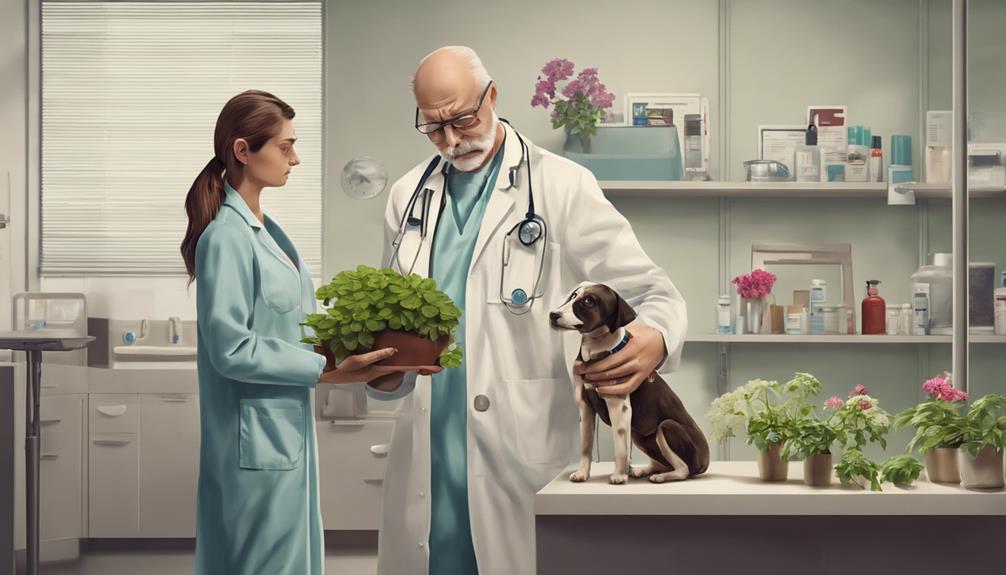Geraniums pose a danger to dogs, exhibiting symptoms such as vomiting, reduced appetite, and skin irritation. If your furry friend consumes geraniums, reach out to a vet without delay. Swift action is crucial. Remember to thoroughly clean the affected area and watch for any worsening symptoms. Seek professional advice for accurate diagnosis and treatment. Treatment options may include IV fluids for severe cases and monitoring for any changes in behavior. Consider offering oats and rice to help calm their digestive system. To avoid poisoning, keep geraniums out of paw’s reach and be aware of potential symptoms. Immediate intervention is key to ensuring your dog’s health and safety. Discover more valuable insights on effectively managing this situation ahead.
Key Takeaways
- Geraniums are toxic to dogs.
- Symptoms include vomiting, skin irritation, and reduced appetite.
- Immediate vet consultation is crucial.
- Treatment may involve fluids, acid reducers, and monitoring.
- Preventative measures include keeping geraniums out of reach.
Common Symptoms of Geranium Toxicity
When dogs ingest geranium, they may exhibit common symptoms such as vomiting, reduced appetite, depression, and skin irritation. These signs indicate that the dog may have experienced toxicity from the geranium plant. It's important to recognize these symptoms promptly to guarantee the well-being of our furry friends.
In cases of geranium ingestion, dogs might display gastrointestinal upset, sedation, nausea, and dermatitis. Larger amounts consumed could lead to more severe symptoms like lethargy and increased skin irritation. Additionally, geranium poisoning in dogs can manifest as diarrhea, drooling, panting, seizures, stumbling, and difficulty breathing.
Being aware of these symptoms can help us take swift action to address any potential issues that may arise from our dogs coming into contact with geraniums. By identifying these signs early on, we can provide the necessary care and support to help our canine companions recover from any toxic effects of geranium ingestion.
Immediate Actions to Take

If your dog shows symptoms like vomiting or skin irritation after consuming geranium, contact your vet immediately for advice.
It's vital to act promptly to guarantee your furry friend's well-being.
Clean the affected area and monitor for any worsening signs while waiting for professional guidance.
Symptoms and Signs
First and foremost, when a dog shows signs of geranium toxicity, swift actions must be taken to address the situation and ensure the dog's well-being. Symptoms of geranium toxicity in dogs may include vomiting, reduced appetite, depression, and red, irritated skin around contact areas. If you notice these signs, it's vital to act promptly.
Reach out to a veterinarian for advice, assess the symptoms and the amount consumed, and check for any rashes or irritation on the skin. In cases of emergency, especially with geranium oil ingestion, quick veterinary intervention is crucial. Small ingestions may not always require a vet visit, but it's still recommended to clean the affected area and remove the plant from the mouth.
For larger ingestions or concerning symptoms, a vet visit is necessary for proper assessment and treatment.
Vet Consultation Recommended
Seek immediate veterinary consultation if your dog has ingested geranium to address potential toxicity and guarantee proper treatment. Veterinarians are equipped to assess the situation, determine the amount ingested, and recommend the necessary actions. They may suggest inducing vomiting, administering activated charcoal, or providing supportive care to mitigate any harm caused by the toxic substance. Prompt vet consultation is crucial as geraniums are poisonous to dogs, and their effects can vary based on the quantity consumed. By seeking professional guidance promptly, you can ensure the best possible outcome for your furry companion. Remember, it's always better to be safe and have a vet check your dog if you suspect they have consumed something toxic.
| Action | Description | Purpose |
|---|---|---|
| Vet Consultation | Seek immediate veterinary advice if dog ingests geranium. | Address potential toxicity |
| Assessment | Veterinarians evaluate the situation, symptoms, and recommend treatment. | Determine appropriate actions |
| Treatment Recommendations | Vets may suggest inducing vomiting, giving activated charcoal, or offering supportive care. | Mitigate harm from toxicity |
Diagnosis and Veterinary Assistance

When diagnosing geranium toxicity in dogs, veterinarians rely on symptoms such as vomiting, reduced appetite, depression, and skin irritation. If your dog exhibits any of these signs after contact with geranium plants, seeking veterinary assistance is vital.
Make sure to provide details on the amount of geranium consumed and any skin reactions observed, as this information aids in diagnosis. In cases where a dog has ingested geranium oil or large quantities of the plant, emergency care may be necessary.
Contacting a veterinarian promptly for guidance and treatment is essential for effectively managing geranium toxicity in dogs. Remember, early intervention can make a significant difference in your pet's recovery. Your vet will be able to provide the best course of action based on the severity of the situation.
If you suspect your dog has been exposed to geranium and is showing concerning symptoms, don't hesitate to reach out for professional help.
Treatment Options for Dogs

When a dog shows symptoms after consuming geraniums, it's important to seek veterinary care promptly.
Providing supportive measures like intravenous fluids may be necessary for severe cases.
In addition, simple remedies like acid reducers and a bland diet can aid in the recovery process for dogs that ingested geraniums.
Symptoms in Dogs
Our priority when addressing symptoms in dogs due to geranium toxicity is to provide prompt and appropriate treatment options. Symptoms such as vomiting, reduced appetite, and gastrointestinal irritation may indicate exposure to geraniums. If your dog shows signs of geranium ingestion, it's essential to seek veterinary advice immediately.
Cleaning the affected area, removing any remaining plant material from the mouth, and monitoring your pet closely are initial steps to take. For more severe cases, supportive care like intravenous fluids and acid reducers might be necessary. Keep an eye out for any changes in behavior or skin irritation, offer water for hydration, and provide a bland diet to help your dog recover from geranium toxicity.
Veterinary Care Needed
Veterinarians may suggest inducing vomiting or administering activated charcoal to dogs that have ingested geraniums to prevent further absorption of toxins. In severe cases, supportive treatment like intravenous fluid therapy may be necessary to address dehydration or electrolyte imbalances.
Acid reducers such as Pepcid-ac or Prilosec can help settle a dog's stomach and ease gastrointestinal symptoms post-ingestion. It's important to closely monitor your dog for any changes in behavior or symptoms after exposure to geraniums. If persistent symptoms like nausea or vomiting occur, seeking veterinary care promptly is essential to determine the best course of action.
Recovery Process for Dogs
During the recovery process for dogs after ingesting geraniums, providing supportive care is vital for their well-being. The seriousness of symptoms can vary, so it's important to monitor your pet closely.
If your dog shows severe signs of poisoning, such as vomiting or difficulty breathing, seek immediate veterinary advice. Treatment options may include intravenous fluid therapy to address dehydration and acid reducers to calm the stomach.
Offering small amounts of water or a bland diet of boiled chicken and rice can help your furry friend recover. Remember, consulting a veterinarian is essential to ensuring the best care for your dog during this challenging time.
Your pet's well-being is our top priority.
Recovery Process and Monitoring

Throughout the recovery process from geranium toxicity in dogs, close monitoring for any changes in behavior, appetite, and symptoms is essential. Providing supportive care, such as administering intravenous fluids if necessary, can aid in the recovery process.
It's important to observe the dog for any signs of improvement or deterioration regularly. Additionally, offering a bland diet consisting of boiled chicken and rice can help soothe the dog's digestive system post-ingestion. If any symptoms persist or worsen, seeking immediate veterinary consultation is crucial for proper management.
Keeping the vet informed about the dog's progress after ingesting geraniums is necessary for appropriate monitoring and care adjustments. Remember, recovery times may vary based on the severity of the toxicity, so patience and consistent monitoring are key during this period.
Preventing Geranium Poisoning

Curious about how to safeguard your dog from geranium poisoning?
To prevent accidental ingestion, it's important to keep geranium plants out of your dog's reach. Educating yourself on the symptoms of geranium poisoning in dogs is critical for early detection. If you suspect your dog has consumed geraniums, seek immediate veterinary advice.
Providing access to fresh water can help with hydration if your dog shows signs of poisoning. Monitoring your dog closely for any unusual behavior or symptoms after exposure to geraniums is significant.
Frequently Asked Questions
What Happens if a Dog Eats Geranium?
If a dog eats geranium, it can experience symptoms like vomiting, diarrhea, drooling, lethargy, panting, seizures, stumbling, skin rash, and difficulty breathing.
The toxins in geraniums can cause gastrointestinal irritation, sedation, nausea, vomiting, and loss of appetite. More severe symptoms can occur with larger quantities, such as depression and skin irritation.
Seeking immediate veterinary care for persistent nausea or vomiting after ingestion is essential for proper treatment and monitoring.
Are Geranium Plants Safe for Dogs?
Geranium plants aren't safe for dogs due to the harmful substances they contain, like geraniol and linalool. If ingested, these can cause vomiting, anorexia, depression, and skin issues in dogs.
Immediate veterinary help is vital if your pet eats geraniums to determine the toxicity level and provide proper treatment. Keep geraniums out of reach to prevent poisoning and guarantee your dog's well-being and safety.
Is Geranium Scent Safe for Dogs?
Monitoring your dog's reaction to strong geranium scents is crucial as they may exhibit signs of discomfort or agitation. Inhaling excessive geranium fragrance could potentially result in respiratory irritation in dogs.
To minimize any adverse effects, consider utilizing diluted geranium essential oils or products around your pets. Keep a close eye on your dog for any negative reactions to geranium scents to guarantee their safety and well-being.
Are Geraniums Toxic?
Yes, geraniums are toxic to dogs. Ingesting parts of the geranium plant can lead to symptoms like vomiting, anorexia, depression, and skin issues.
While severe cases are rare, immediate veterinary care is essential if ingestion occurs. Remember, prevention is key to keeping our furry friends safe. Be mindful of the plants in your home and yard to establish a pet-friendly environment.
Are Some Flowers Toxic to Dogs and How Can I Keep My Dog Safe from Toxic Plants?
Keeping your dog safe from toxic plants is crucial, especially when it comes to tulips. As beautiful as they are, tulips can be harmful to dogs if ingested. To ensure tulips and dogs’ safety, it is essential to keep them out of your pup’s reach. Consider pet-friendly alternatives or create a designated area for your dog where these plants are not present.
Conclusion
To sum up, it's important to be aware of the potential dangers geraniums can pose to dogs. Just like how a red stop sign signals danger on the road, the symptoms of geranium toxicity in dogs should be recognized and treated promptly.
By taking immediate action, seeking veterinary assistance, and implementing preventative measures, we can help keep our furry friends safe from harm.
Stay informed and proactive to protect your pets from potential dangers like geranium poisoning.










